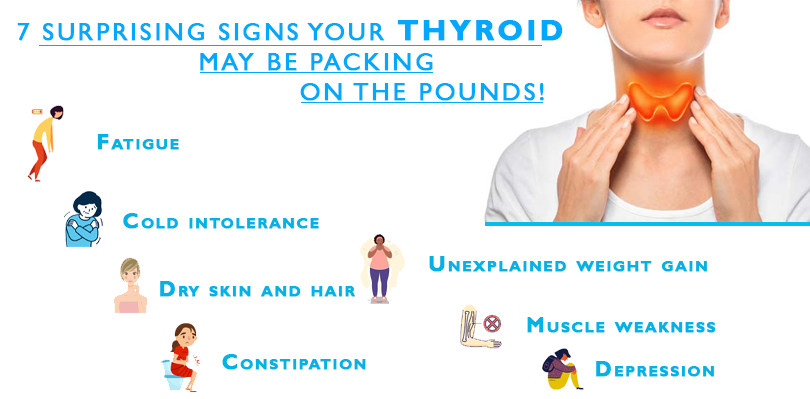Are you struggling to lose weight despite your best efforts? The culprit might be hiding in an unexpected place: your thyroid. This small, butterfly-shaped gland located in your neck plays a crucial role in regulating your metabolism, and when it’s not functioning properly, it can cause unwanted weight gain.
Weight gain is a common symptom of thyroid disorders, and it’s often accompanied by a range of other symptoms that can be difficult to pinpoint. But fear not, by understanding the surprising link between your thyroid and weight gain, you can take steps to restore your health and finally achieve your weight loss goals. Let’s explore this fascinating connection and discover what you can do to get back on track.
Surprising Link Between Your Thyroid And Weight Gain
Your thyroid gland might be small, but it has a big impact on your body’s metabolism. This gland produces hormones that help regulate your metabolism, the process by which your body converts food into energy. When your thyroid isn’t functioning properly, it can slow down your metabolism, causing you to burn fewer calories and leading to weight gain. This surprising link between your thyroid and weight gain is more common than you might think, affecting millions of people worldwide. In fact, studies suggest that up to 60% of people with hypothyroidism experience weight gain as a symptom.
One of the most common thyroid disorders associated with weight gain is hypothyroidism, a condition in which the thyroid gland doesn’t produce enough hormones. This can lead to a slower metabolism, fatigue, and weight gain, even with reduced calorie intake.
7 Surprising Signs Your Thyroid May Be Packing on the Pounds!

To help you identify if your thyroid is to blame for your unwanted pounds, we’ve compiled a list of 7 surprising signs that your thyroid may be packing on the pounds:
1. Fatigue
Feeling tired all the time, even after getting enough rest, is a common symptom of hypothyroidism. This is because the thyroid hormones play a role in regulating your body’s energy levels. When your thyroid gland is not producing enough hormones, it can slow down your metabolism, making you feel sluggish and tired.
2. Cold intolerance
Feeling cold all the time, especially in your hands and feet, is another symptom of hypothyroidism. This is because the thyroid hormones help regulate your body’s temperature. When your thyroid gland is not producing enough hormones, it can cause your body to have a lower metabolic rate, which can make it harder to stay warm.
3. Dry skin and hair
Your thyroid hormones also play a role in maintaining healthy skin and hair. When this gland is not producing enough hormones, it can lead to dry, itchy skin and brittle, dry hair.
4. Constipation
Your thyroid hormones also help regulate your digestive system. When this gland is not producing enough hormones, it can slow down your digestive system, leading to constipation and other digestive problems.
5. Unexplained weight gain
One of the most common signs that your thyroid gland may be responsible for your weight gain is that the gain is unexplained. Even if you’re eating a healthy diet and exercising regularly, you may still be gaining weight if this gland is not functioning properly. This is because the thyroid hormones play a crucial role in regulating your metabolism, which determines how efficiently your body burns calories.
6. Muscle weakness
Your thyroid hormones also help regulate muscle function. When this gland is not producing enough hormones, it can lead to muscle weakness and fatigue.
7. Depression
Thyroid hormones also play a role in regulating your mood. When this gland is not producing enough hormones, it can lead to feelings of sadness, depression, and a lack of motivation. These symptoms can also contribute to weight gain by making it harder to stick to healthy habits.
If you’re experiencing any of these signs, it’s important to talk to your doctor. With proper treatment, you can restore your health and promote weight loss.
Related: How To Lose Weight With Hypothyroidism? Treatment And Exercises
FAQs
Can hypothyroidism cause weight gain?
While hyperthyroidism, can cause weight loss, it is less likely to cause weight gain. This is because hypothyroidism can cause your metabolism to speed up, making it easier for your body to burn calories. However, in some cases, an overactive thyroid can cause an increase in appetite, which could lead to weight gain if you’re not careful with your food choices.
Can treating an underactive thyroid help with weight loss?
Treating an underactive thyroid can definitely help with weight loss. When your thyroid gland is not producing enough hormones, it can be very difficult to lose weight, even if you’re making healthy lifestyle choices. However, once you start taking medication to replace the missing hormones, your metabolism will start to speed up and your body will be better able to process and burn off calories. This can make it easier to lose weight and maintain a healthy weight in the long term.
How can I reduce my weight gain with hyperthyroidism?
Weight gain is a common symptom of underactive hypothyroidism. The most effective way to reduce hypothyroidism weight gain is to get your hormone levels back to normal through medication and lifestyle changes. Here are some steps you can take:
- Consult a healthcare provider
- Take your medication
- Eat a healthy, balanced diet
- Exercise regularly
- Manage stress
- Get enough sleep

